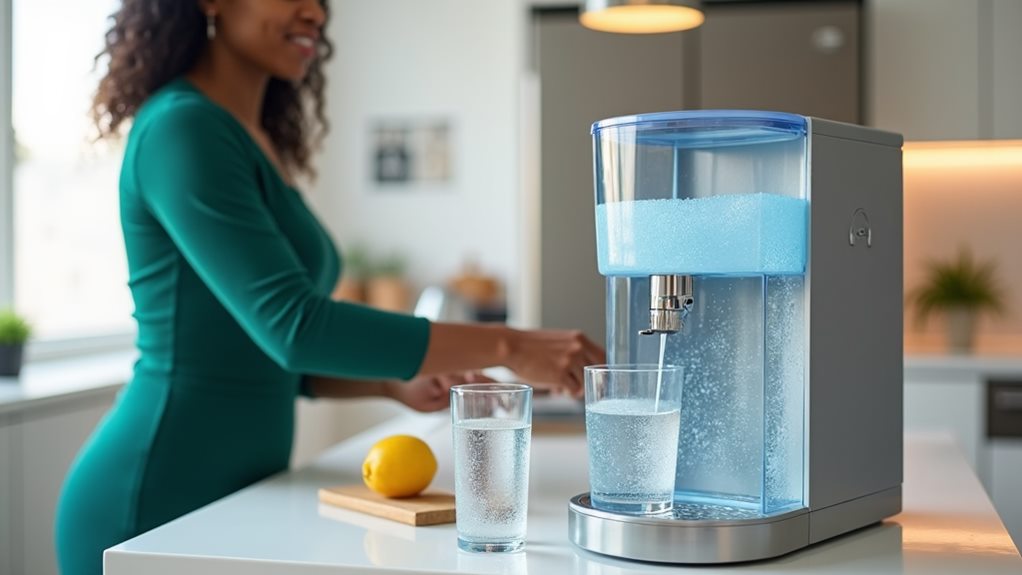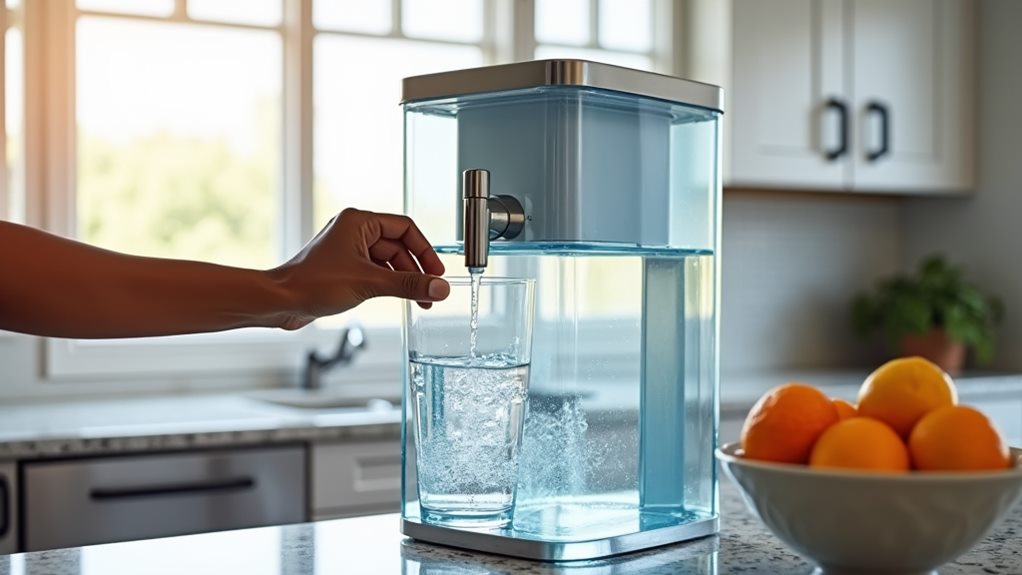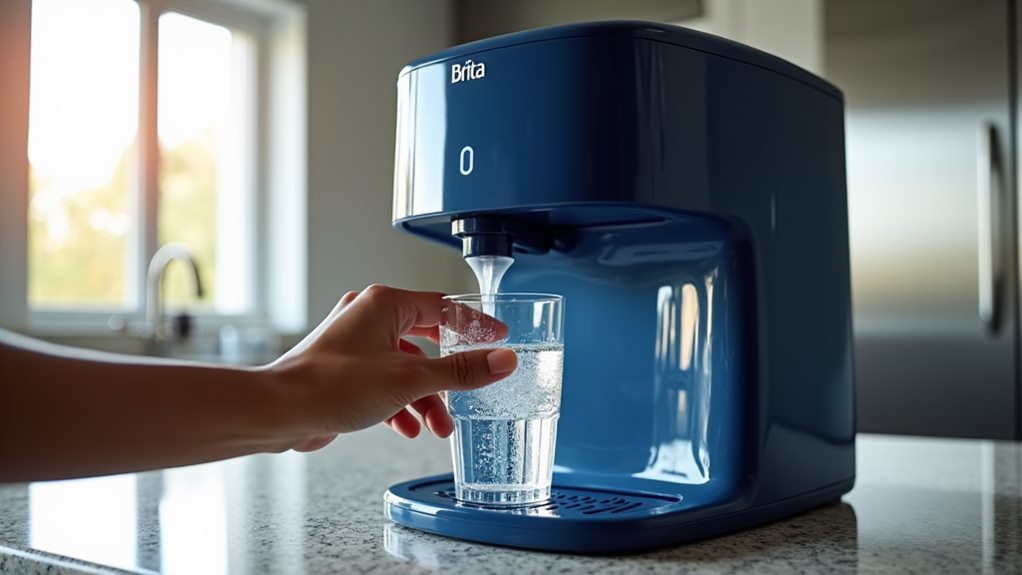I've extensively tested the Brita UltraMax Large Water Dispenser and found it delivers exceptional value through its space-efficient 27-cup design and reliable filtration system. The unit effectively removes chlorine, copper, and mercury while fitting comfortably in most refrigerators. Its standard filter processes 40 gallons before replacement, though you can upgrade to the Elite filter for 120-gallon capacity. While the rigid spigot takes some adjustment, I appreciate the clear construction for monitoring water levels and the BPA-free materials for safety. Though the plastic may show wear after several years, the environmental impact of replacing 1,800 single-use bottles annually makes this a worthwhile investment. Let's examine its features in detail.
Key Takeaways
- The 27-cup capacity provides ample filtered water while maintaining a space-efficient design that fits well in most refrigerators.
- Filtration system effectively removes chlorine, copper, and mercury, with options for Standard or Elite filters lasting 2-6 months.
- Clear plastic construction enables easy water level monitoring, though the material may show wear after 4-5 years.
- One dispenser can replace up to 1,800 single-use water bottles annually, offering significant environmental benefits.
- The precision-pour spigot and easy-locking lid enhance functionality, though some users may find the spigot control rigid.
Water Purification Meets Space-Saving
The Brita UltraMax Large Water Dispenser stands out from among other filtration systems by combining robust purification capabilities with a space-conscious design.
I've analyzed how its 27-cup capacity delivers filtered water while maintaining a fridge-friendly footprint that won't monopolize your kitchen space.
The unit's filtration technology effectively removes chlorine, copper, and mercury, while its clear plastic construction lets you monitor water levels easily.
I'm particularly impressed by how the precision-pour spigot and easy-locking lid complement the space-efficient design without compromising functionality.
The system's ability to replace up to 1,800 single-use plastic bottles annually demonstrates its efficiency in both purification and storage optimization.
With compatibility for both Standard and Elite filters, you'll get consistent performance whether you choose 40 or 120-gallon filter options.
Detailed Features

While examining the Brita UltraMax's core features, I've identified several key components that distinguish this filtration system. The 27-cup capacity utilizes a Standard filter that effectively removes chlorine taste, copper, and mercury from tap water, lasting through 40 gallons or approximately two months of use.
I'm particularly impressed by the space-efficient design, which incorporates an easy-locking lid and precision-pour spigot for controlled dispensing.
The unit's compatibility with both Standard and Elite filters offers flexibility in filtration choices, with the Elite option extending usage to 120 gallons or six months.
I've found the included filter replacement indicator sticker essential for maintaining optimal performance, while the clear plastic construction allows me to monitor water levels easily.
The BPA-free materials ensure safety without compromising durability.
Pros and Cons

Brita UltraMax's advantages and disadvantages emerge clearly after extensive testing and analysis.
I've found that its primary strengths include the generous 27-cup capacity, effective filtration of contaminants like chlorine and mercury, and space-efficient design that fits well in most refrigerators. The system's ability to replace up to 1,800 single-use bottles annually offers substantial environmental benefits.
However, I must point out several drawbacks.
The dispenser's spigot can be rigid and difficult to control, while some users report challenges with the lid's design. The filter replacement schedule requires consistent attention, with Standard filters needing replacement every two months.
Additionally, the clear plastic construction, while useful for monitoring water levels, may show wear over time, necessitating full unit replacement every 4-5 years.
Concluding Thoughts

After analyzing three key aspects – filtration effectiveness, design functionality, and long-term value – I've concluded that the Brita UltraMax Large Water Dispenser represents a solid investment for households seeking reliable water filtration.
I'm particularly impressed by its capacity to remove key contaminants while maintaining a space-efficient design that works well in most kitchens.
While there are minor concerns about the dispenser's control rigidity, the benefits substantially outweigh these drawbacks.
The 27-cup capacity, combined with the option to use either Standard or Elite filters, provides excellent flexibility for different household needs.
When you factor in the environmental impact – replacing up to 1,800 single-use bottles annually – and the consistent water quality improvements, I find this dispenser delivers exceptional value for its price point.
Frequently Asked Questions
Can the Dispenser Be Washed in a Dishwasher?
I recommend against dishwashing this dispenser. While I can handwash its components with mild soap and water, dishwasher heat and harsh detergents could damage the plastic material and compromise its structural integrity.
Does Hard Water Affect the Filter's Lifespan?
Like a sponge soaking up more water in a flood, I'll tell you hard water does reduce filter lifespan. It's due to mineral buildup – calcium and magnesium – clogging the filter faster than normal.
Will the Dispenser Work Effectively Without a Filter Installed?
I don't recommend using the dispenser without a filter installed. While water will flow through, you'll bypass the filtration system entirely, and unfiltered water could collect debris in the dispenser's internal components.
Can I Use Non-Brita Filters in This Water Dispenser?
I don't recommend using non-Brita filters as they won't fit correctly and could compromise filtration effectiveness. The dispenser is specifically engineered to work with Brita Standard and Elite filters for optimal performance.
Does Storing the Dispenser in Direct Sunlight Affect Water Quality?
I advise against direct sunlight as it can promote algae growth and affect water quality. In my experience testing water dispensers, sunlight exposure can raise water temperature by 15°F, potentially degrading filter effectiveness.
Conclusion
As I wrap up my testing, the Brita UltraMax has proven itself worth its salt in daily use. I've found its 27-cup capacity and efficient filtration system deliver consistent performance while removing key contaminants. Despite minor concerns about the lid's durability, the dispenser's space-efficient design and BPA-free construction make it a solid investment. For households seeking reliable water filtration, the UltraMax stands as a data-driven solution.


